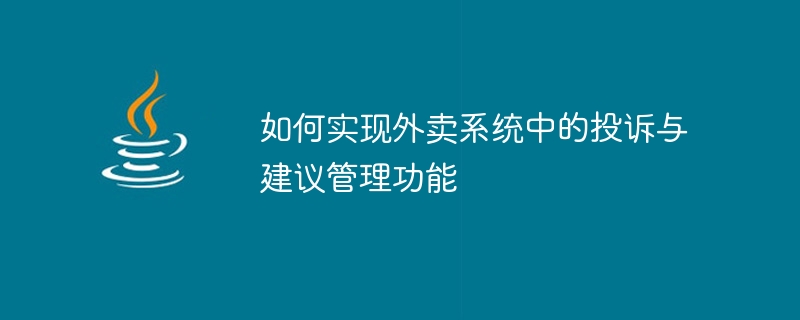

How to implement the complaint and suggestion management function in the food delivery system
With the rapid development of the food delivery industry, the food delivery platform has become an indispensable part of people's lives. However, problems gradually emerged, such as order errors, delivery delays, food quality issues, etc. For consumers, they need a convenient channel to complain about problems and make suggestions. Therefore, the complaint and suggestion management function in the food delivery system has become particularly important. This article will explore how to implement this functionality.
The first step is to establish a platform for complaints and suggestions. The platform should be able to seamlessly connect with the food delivery system to facilitate users to submit complaints and suggestions. Users can express their opinions through simple operations and attach relevant order information and pictures. At the same time, for the convenience of users, the platform should also provide the function of automatically generating complaints or suggestions, so that users can check the processing progress at any time after submission.
The second step is to associate complaints and suggestions with specific orders. By associating complaints and suggestions with specific orders, food delivery platforms can locate problems more quickly and take appropriate measures to solve them. For example, if a user complains about a delivery delay, the system can quickly find relevant order information based on the order number and combine it with the delivery person's location information to further analyze the cause of the problem.
The third step is to establish a dedicated processing team. The complaint and suggestion management feature requires a dedicated team to handle user issues. This team should be composed of experienced customer service personnel with problem-solving abilities and good communication skills. They should promptly respond to user complaints and suggestions and actively negotiate solutions with users.
The fourth step is to establish a hierarchical management system. Complaints and suggestions of different levels should be handled differently. Serious problems should be dealt with immediately and resolved quickly. Minor problems can be resolved over a longer period of time. In order to ensure that the problem is properly handled, different levels of processing personnel can be set up to handle the problem step by step according to the urgency and importance of the problem.
The fifth step is to record and analyze the data of complaints and suggestions. By recording and analyzing complaint and suggestion data, takeaway platforms can discover the commonalities and patterns of problems, further improve services and optimize user experience. For example, if it is found that most users complain about order errors, then the food delivery platform can consider introducing a smarter order processing system to reduce the possibility of errors.
In short, implementing the complaint and suggestion management function in the takeout system requires establishing a complaint and suggestion platform, associating problems with specific orders, and establishing a dedicated processing team to handle user problems. At the same time, establishing a hierarchical management system and recording and analyzing data can help takeout platforms better solve problems and improve user experience. Through these measures, takeaway platforms can better meet user needs and improve user satisfaction.
The above is the detailed content of How to implement the complaint and suggestion management function in the takeout system. For more information, please follow other related articles on the PHP Chinese website!




